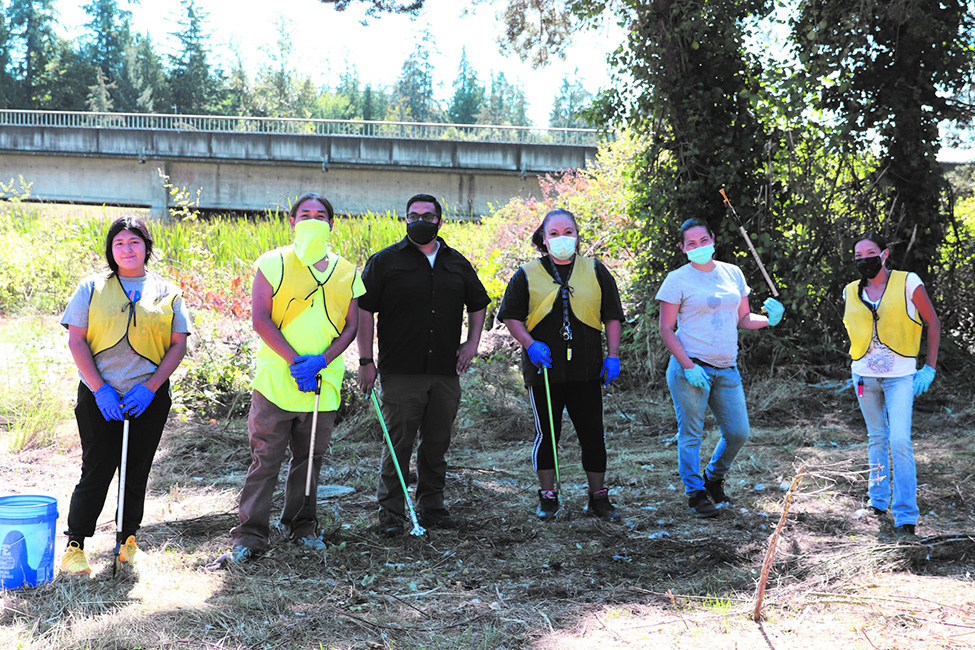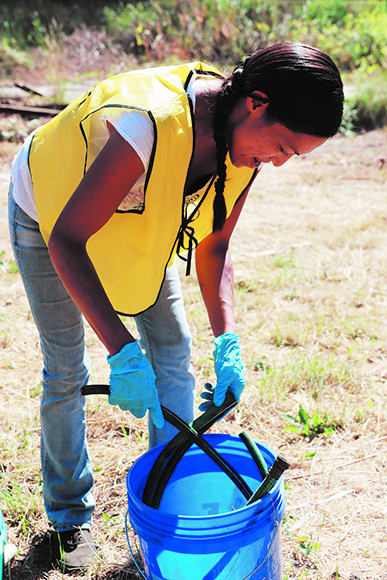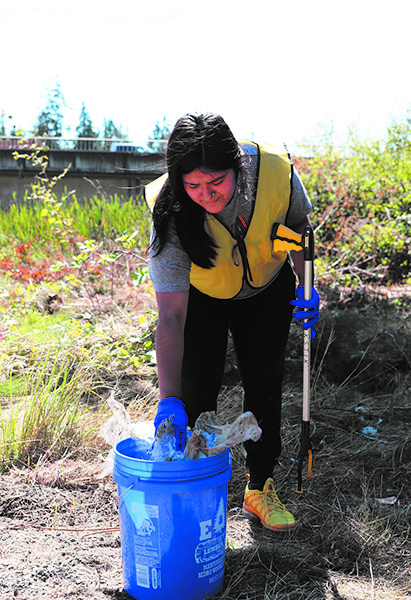
By Kalvin Valdillez, Tulalip News
With the late August weather reaching the mid-70’s on a Friday afternoon, cars zoomed across the recently widened bridge that spans across Quil Ceda Creek, windows down and music blaring. On the side of the bridge, nearest to 27th street, a group of volunteers were hard at work. With yellow vests and extendable trash grabbers, the crew spent four hours cleaning an area that is often frequented by the homeless and addicted populace. Once their blue bucket was filled to the top with rubbish, they transferred the trash to a large dumpster and began working on a new area.
The members of the working crew are the very first participants of a new program called Tulalip Community Give Back, organized by the Tulalip Probation Office. And despite the physical work and warm weather, the participants wore smiles and shared stories and jokes while they worked.
“We’re picking up around the bridge on both sides, just cleaning up and picking up all the garbage and debris,” said volunteer, Yessenia Vega-Simpson. “This is the first day of the program and so far it’s a pretty cool program. There’s two groups, one in the morning and one in the afternoon, so you can pick and choose your time. I’m doing the full eight hours so I can hurry up and get my community service done. “
Like many new or redesigned programs, Tulalip Give Back was created in response to the novel coronavirus disease when clients of the Tulalip Justice Center could not fulfill their community service hours.
“Our only structure pre-COVID was community service, essays, court observation, and unfortunately warrants or jail time,” said Tulalip Probation Officer, Angel Sotomayor. “Post-COVID (outbreak), of course we don’t want to put anyone behind bars if we can prevent it, but community service work is limited within the communities we used to send them to. So we wanted to try something different, a method of community service that is Tulalip specific and includes community involvement and interaction with other departments within the Tribe.”

Previously, Justice Center clients would normally volunteer their time at community service programs located in nearby cities such as Marysville and Everett. However, once the Stay Home, Stay Safe mandate went into effect, the need for community service workers decreased significantly to the point that Tulalip members were falling out of compliance due to limited work available.
Angel stated, “We are working with those clients who need that extra structure, who have been out of compliance, who volunteer to opt-in and give back to the community in this aspect instead of warrants, jail time, or writing an essay. The Tulalip Community Give Back program will be two days a week, but at the start of it we’re only going to do it one day a week for eight hours. There are two crews, 7:30 a.m.-11:30 a.m. and a 12:30 p.m.-4:30 p.m. on Fridays. This way, those who have children obligations during the first part of the day, can come to the second session or vice versa.”
A common theme throughout the design of the Give Back program is rebuilding and strengthening that connection between the clients and the community. Angel and the Justice Center hope that by collaborating with other departments, their clients will become more familiarized with the people in a professional manner and acquire new skills that they could add to their resumes when job hunting. Angel hopes that as word about the Give Back program spreads, more departments will reach out when in need of any general assistance that can be entrusted to their clients.
Out the gate, the program is receiving a huge boost from the Tulalip Public Works department that assigned a 12-passenger van to the program to transport the clients to each worksite every week. Public Works is also providing the Probation Office with work locations as well as any necessary tools or services required to get the job done.
“We teamed up with Sam Davis and his staff and they agreed to provide us with all the tools we need – safety vests, glasses, first aid and training so they know how to properly deal with broken glass, and hazardous things they might find when cleaning up,” said Angel. “Hopefully down the road, as the program continues to develop, they’ll be able to add these tasks as an acquired skill; leaf blowing, power washing, mowing lawns, scanning documents or shredding documents. That’s our long term goal, to be able to give them the tools to build themselves up, to be a member of the community and not feel that they are different than anyone else. Yes, they are still on probation, but they are still a member of this community.”
It seems that with each day that passes, the program continues to grow. Already, the Tulalip Give Back program is slated to clean up the housing developments built on the reservation including Mission Highlands, Battle Creek, and Silver Village.
“I believe this is very important work that is being done,” Sam Davis, Public Works Director of Operations stated. “Giving these community members the opportunity to give back in a good way [is] awesome to see. Also the impact these cleanups have in terms of community health, public safety, and environmentally are huge.”
On the first day of the program, the morning of August 28, the Tulalip Tribal Court’s Chief Judge, Michelle Demmert, offered some inspiring words to the morning crew after they received their required COVID screenings. She applauded them for volunteering their time, while also expressing a desire to incorporate more Tulalip culture into the program. And with the possibility of more funding in the near future, the Give Back program is doing some tentative planning with ideas of weaving classes and other traditional teachings in mind.
Angel also stated that the program is in talks with the Tulalip Fish Hatchery to put their volunteers to work and learn more about the salmon, its life cycle and significance to the Salish people. By adding a cultural aspect to the program, the clients get the chance to revisit the traditions and teaching of their people in addition to picking up trash and caring for the land.
“We think that this is going to help build that relationship with the community, where they can interact and gain skills to give back to Tulalip, because most of our clients are Tulalip tribal members,” expressed Angel. “This gives them the opportunity to show that they’re volunteering to do this, they want to be a part of this community, they still want to get through these conditions, pay back those fines, stay out of jail and hopefully find their path.”

Staying true to the theme of strengthening relationships, Angel, and volunteers from the Justice Department, plan on being on site during each community service gathering, lending a hand as well as any guidance needed throughout the day. By rolling up their sleeves and working side-by-side, the court hopes to build trust, understanding, and meaningful, long-lasting relationships with their clients.
Nine participants showed up in total for the first day of the Tulalip Community Give Back program, many of whom spent the entire eight hours in the field, filling up an extra-large dumpster with garbage that was recovered from both sides of the Quil Ceda Creek bridge. In addition to all the trash collected, the participants flagged over 50 used needles that were scattered about, which Angel safely handled and disposed of.
“We no longer have to rely on Marysville or surrounding communities, we can focus on what Tulalip needs,” Angel said. “It was motivating watching these clients work so hard today. It has given me the drive to continue to do what I am doing. Times have been difficult for everyone during this pandemic, across the entire Tribe we have had to develop new methods to better assist those which we serve. I commend everyone for their efforts during these trying times. Today really reminded me of how important it is to develop alternate methods of engagement with our clients. If anyone has a moment stop by and take a look at the area beside the bridge, adjacent to the QCC Casino, you will notice it looks night and day different. These clients did an outstanding job. I am excited to continue to work towards the growth and further development of this program.”
Eight hours closer to completing her community service hours, Yessenia reflected, “I thought it was just community service, but today I learned that this time could also be used as an opportunity to learn new skills to help people get a job. We’re not just picking up garbage; we’re going to be all over, at the fisheries, helping with housing, shredding papers somewhere. It feels pretty good giving back and helping clean up and take care of our rez.”
For more information, please contact the Tulalip Tribal Court Probation Office at (360) 716-4773.